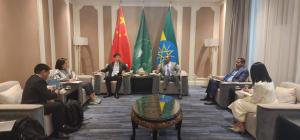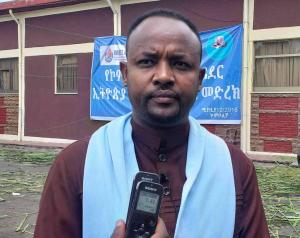Economy - ENA English
Economy
Ethiopian Performance in MRO Lauded
Apr 25, 2024 484
Addis Ababa, April 25, 2024 (ENA) The success of Ethiopian Airlines is not only on the passenger side but also in maintenance, repair, and overhaul (MRO), Fairfax Africa Fund Global Chairman Zemedeneh Negatu said. In an exclusive interview with ENA, the chairman said Ethiopian Airlines has a very large MRO shop, which is one of the biggest in the world and the best in the world to maintain modern aircrafts. It’s a very well-known organization for maintaining aircrafts, not only for itself but other airlines send their aircraft here, he added. According to Zemedeneh, Ethiopian Airlines is the biggest airline in Africa and one of the largest in the world. “Its success is not only predicated on its ability to transport passengers from around the world, but also its ability to maintain these very sophisticated, very expensive aircrafts.” Moreover, Bole International Airport is today the largest gateway for travel into and out of Africa. “On top of that, Ethiopian Airlines, which travels from Africa to other parts of the world and into Africa, is bigger than Emirates, Turkish, and Lufthansa combined in Africa.” One of the challenges a lot of African airlines face in addition to not being able to afford to acquire aircraft is not being able to find affordable and quality MRO services on the continent, the chairman said. He added that African carriers used to send or send their aircraft to Europe or in some cases all the way to the United States to repair and maintain their aircraft at very expensive rates, whereas Ethiopian Airlines, certified by all the manufacturers, is right here in Africa. Presently, however, Zemedeneh said that you see aircraft from many African countries, including Nigeria and Rwanda, among others. The pan-Africanism that we talk about is being demonstrated clearly to the active support of Ethiopian Airlines for other African carriers, he noted. “I think it is a testament to what happens when you have investment, vision, determination and the capacity to deliver something that used to be considered stuff to be done in Europe, stuff to be done in America, is done in Africa right here in Ethiopia.” The chairman pointed out that Ethiopian Airlines has been doing this for a very long time. The airline has been around for almost 75 years, but the maintenance shop has also been around for decades. The airline has the expertise and is benefiting other African carriers as well, he stated. Recognizing the necessity of effective MRO services for the smooth operation and success of an airline, Ethiopian Airlines operates a modern MRO facility at its hub in Addis Ababa, established in 1957, and developed over the years.
Ethiopian MRO Services Ready to Cooperate with Fellow African Airlines, Manufactures: CEO
Apr 24, 2024 798
Addis Ababa, April 24,2024 (ENA) Ethiopian Maintenance, Repair and Overhaul (MRO) Services, the strategic business unit of Ethiopian Airlines, is ready to cooperate with fellow African Airlines and manufacturers, Ethiopian Airlines CEO Mesfin Tasew said. African Aviation MRO and Aviation Training Conference and Exhibition is underway in Addis Ababa under the theme of “Strengthening Africa’s MRO and Training capacity for the future.” MRO Africa and Aviation Training Conference and Exhibition brings African Airlines, MRO Service providers, original equipment manufacturers, regulatory bodies and other stakeholders together every year to discuss common issues related to MRO services. Speaking at occasion, Ethiopian Airlines CEO, Mesfin Tasew said this event would be important for African airlines to meet with manufacturers, suppliers, and service providers in one place, to address their issues and develop relationships. It provides the opportunity to network, exchange ideas, share experiences, learn about industry trends, and engage in dialogues about future directions. Thus, the CEO noted that recognizing the necessity of effective MRO services for the smooth operation and success of an airline, Ethiopian Airlines operates a modern MRO facility at its hub in Addis Ababa, established in 1957, and developed over the years. In addition to supporting Ethiopian Airlines, this facility is providing different MRO services to other airlines both in Africa and the Middle East, he elaborated. The services include airframe, engine and component maintenance, engineering and material services. “We are investing a lot of money to further expand our MRO facilities and capabilities to meet the needs of our growing operation and cater for the needs of other airlines in the region.” Moreover, Mesfin said at this time, we are building two more hangars, a modern component maintenance complex, and a state-of-the-art aircraft parts warehouse here at our base, which are all expected to be completed by the end of 2024. “We understand every airline cannot do this since it needs economies of scale. However, there is a big opportunity for cooperation among African Airlines, manufacturers, suppliers and other stakeholders to avail the service in Africa at reasonable costs,” he underlined. “Let us open up our minds and work towards more cooperation both at operational and strategic levels.” He reaffirmed that Ethiopian MRO Services, the strategic business unit of Ethiopian Airlines Group, is ready to cooperate with fellow African Airlines and manufacturers in this respect. State Minister of Transport and Logistics, Denge Boru said Ethiopia is committed to fostering the growth and development of the aviation industry, not only in Ethiopia, but across the African continent. “We recognize the vital role that maintenance and overhaul play in ensuring the safe, reliability and protection of air travel, as we are dedicated to supporting initiatives that address these critical conditions.” He stressed that as key aspects of aviation safety, and excellent the MRO division requires different channels and innovations. The African Airlines Association (AFRAA) Secretary General, Abdérahmane Berthé said on his part Africa needs safe, secure efficient and economically viable air transport to support integrated economic development. The number of aircraft operated on the African continent in the next 10 years is estimated to reach 1,429 units as the result of a growth rate of 2.3 percent per year from 2024-34. To operate more aircrafts, it will be critical to facilitate the access to aircraft financing for airlines and to develop MRO capacities across the continent, he elaborated. Finally, he called African Airlines, MROs, and African Aviation Training Organizations to cooperate better to create the needed environment for sustainable the future growth of African Air Transport market.
Ethiopian, AFI-KLM E&M Sign Agreement to Cooperate for Boeing 777 Component Fleet Support
Apr 24, 2024 769
Addis Ababa, April 24/2024 (ENA) Ethiopian Airlines and Air France Industries-KLM Engineering and Maintenance (AFI-KLM E&M) signed an agreement for component support for Ethiopian Boeing 777 fleet today. The agreement was signed by Ethiopian Airlines CEO Mesfin Tasew and AFI-KLM E&M Senior Commercial Vice President Pierre Teboul. CEO Mesfin said on the occasion it is a component support agreement for Ethiopian and Boeing, and it is ten-year contract covering over 500 components for which Ethiopian Airlines does not have internal repair capability. Thanking the company for the service it has been providing, he added that the agreement was reached based on “our good experience of the service that we have been getting in the past.” AFI-KLM E&M Senior Commercial Vice President Pierre Teboul said on his part that his company is committed to working and cooperating with Ethiopian Airlines. "Ethiopian Airlines and AFI-KLM E&M are not new to work together. We already did it in the past." And the next step would be to think about additional cooperation, he added.
PM Nabbanja Says Uganda Keen to Work with Ethiopia in Industrialization Sector
Apr 24, 2024 566
Addis Ababa, April 24/2024 (ENA) The Prime Minister of Uganda, Robinah Nabbanja, said that her country is keen to work in collaboration with Ethiopia in using industrialization experience accumulated in developing and managing industrial parks. According to the Industrial Parks Development Corporation, the prime minister made the remark following her visit to Bole Lemi Industrial Park today. “We will work in cooperation using Ethiopia's industrialization experience,” Nabbanja is quoted as saying. The Ugandan PM also expressed her excitement with the overall activity that she observed at the industrial park, indicating that there will be more communication to carry out further joint activities in the sector. Industrial Parks Development Corporation CEO Aklilu Tadesse briefed Prime Minister Nabbanja about the corporation and the general activities of Bole Lemi Industrial Park.
Ethiopia, UNAIDS Discuss on Sustainable Health Financing Strategy
Apr 24, 2024 506
Addis Ababa, April 24,2024 (ENA) State Minister of Finance Semereta Sewasew, discussed with UNAIDS Director of the Regional Support Team for Eastern and Southern Africa, Anne Muthoni on Sustainable Health Financing Strategy. The discussion focuses on the challenges, good practices, and areas of improvement in the health sector particularly with the global aim of ending AIDS. On the occasion, the state minister highlighted that Ethiopia has been making huge investments in the health sector with the aim of increasing the access and improving the quality of services. Moreover, she stated that the country is trying to respond to the growing new AIDS infections among the youth which needs more attention and effort. Muthoni also stressed the collaboration on the global strategy of UNAIDS to end the epidemic. In this regard, both sides emphasized the importance of sustainable financing and collaboration as a key success factor.
Zenith Steel Company to Invest Over 150 Million USD in One Of Ethiopia’s Industrial Park
Apr 24, 2024 443
Addis Ababa, April 24/2024 (ENA) Zenith Steel Company, which is known for producing high-quality steel and electrical equipment in China, has expressed its desire to enter and invest in Bole Lemi Industrial Park, Ethiopia. The Ethiopian Industrial Parks Development Corporation (IPDC) CEO Aklilu Tadese, received and spoke with the General Manager of the company Liwon Donga and officials. The largest number of foreign investors in the industrial parks managed by the corporation are Chinese, the CEO said. For this reason, he mentioned that the corporation has also opened a Chinese investment desk. Officials of the company explained the investment plan, current activities of the company and the work they plan to do in the first phase. Zenith Steel Company, which is based in Changzhou Province, China set a plan to acquire 30 hectares of leased land in the Bole Lemi Industrial Park and invest more than 150 million US dollars.
UN, AU Call for Stronger Collaboration to Address Africa's Challenges to Achieve SDGs
Apr 23, 2024 495
Addis Ababa, April 23/2024 (ENA) The United Nations and the African Union have called for stronger partnership and collaboration to address challenges facing Africa in achieving the Sustainable Development Goals (SDGs). The 10th Africa Regional Forum on Sustainable Development opened in Addis Ababa today. Speaking on the occasion, UN Deputy Secretary-General Amina Mohammed said Africa has been facing multiple crises, including debt increase by 183 percent, that is roughly four times higher than the region's growth rate in (U.S.) dollar terms since 2010. According to her, the total debt service accounted for a staggering 47.5 percent of government revenue in Sub-Saharan Africa last year. The UN Deputy Secretary-General noted that “the gap is enormous. An additional 4 trillion USD must be invested every year to 2030 to have a chance of achieving the SDGs globally.” This forum came ahead of a crucial international conference in September, presenting an opportunity for African leaders to advocate for a more equitable global financial system and secure increased investments and debt relief, it was learned. Recall that UN Secretary-General António Guterres called for an SDG stimulus of at least 500 billion USD a year to scale up affordable long term financing for developing countries. Amina insists that Africa's leadership and collective voice will be essential to make the stimulus a reality. African Union Commission (AUC) Deputy Chairperson, Monique Nsanzabaganwa, on her part reiterated Africa's unwavering commitment to Agenda 2063. She recalled that the AUC adopted the second ten-year implementation plan in February, acknowledging both the successes of the first decade and the need to address emerging challenges and opportunities. The second plan seeks to address the emerging challenges and tap the emerging opportunities to accelerate the implementation of the Agenda. According to her, domestic resource mobilization and stronger partnerships are key to achieving the development goals. However, she stated that many African governments have been facing self-inflicted and external challenges, and these challenges require stronger UN-AU partnership. “We need to go back to doing the basics of correcting all these gaps and inefficiencies, which is where our collaboration between the African Union and the United Nations is key, so that we bring back that conscious and that spirit of collaboration in our several multilateralism forum.” Representing President Sahlework Zewdie, the Planning and Development Minister Fitsum Assefa called for prioritizing poverty eradication and the needs of the most vulnerable groups. Eradicating poverty requires a holistic approach with substantial investments in peace building, education, healthcare, infrastructure, and sustainable livelihoods. “The enormous challenges we are facing today demand our resolute commitment to eradicating poverty and ensuring the delivery of sustainable, resilient and innovative solutions. (And) in doing so, we must prioritize the needs of the most vulnerable groups.” The forum that will be held until Thursday is aimed to serve as a platform for stakeholders to discuss solutions to accelerate progress towards the SDGs and Agenda 2063. The United Nations Economic Commission for Africa (UNECA), in collaboration with the African Union Commission, organized the three-day forum.
Ethiopia Set to Host African Cities Sustainability Forum
Apr 23, 2024 559
Addis Ababa, April 23/2024 (ENA) Addis Ababa will host the first African Cities Sustainability Forum in the upcoming September 2024. The forum will be held under the theme “Sustainable Urbanization Planning for Africa’s Transformation - Agenda 2063,” it was indicated. As part of Ethiopia’s preparation to host the forum, Deputy Prime Minister Temesgen Tiruneh held an awareness raising forum today with the African Urban Forum National Coordinating Committee. Addis Ababa is gearing up to host the African Cities Sustainability Forum anticipated to bring about more than 1,500 participants, the deputy PM shared on a social media page. Temesgen also stated in his message that Ethiopia, as a historic country and a founding member of the United Nations and the Organization of African Unity, is prepared to fulfill its African responsibility by organizing this forum of African brothers.
Economic Sectors Permitted for Foreigners Provide Multi-faceted Positive Impacts
Apr 23, 2024 487
Addis Ababa, April 23/2024 (ENA) The decision passed by the government to allow foreign investors to take part in economic sectors that were previously restricted only for Ethiopian citizens will have a multi-faceted positive impact on the economic development of the country, economists remarked. The Ethiopian Investment Board has recently passed a directive that would allow foreign investors to participate in wholesale and retail trade in the country. The economists who talked to ENA noted that the directive will reportedly provide more opportunity for legally viable competitive trade and would play a clear role in providing broader choices for consumers. A senior economist, Constantinos Berhe remarked that allowing foreign investors to take part in wholesale and retail sale trade has greater value for economic development of the country. Citing the experiences of several countries across the world, the economist added that foreign investors in the sector will bring in their work experience, capital expenditures which will allow them to play a clear and positive role in the country’s economic development. Companies who take part in foreign trade in Ethiopia will help to further expand foreign trade coverage and market network for the country and will enhance the nation’s capacity to compete in world trade. Moreover, the directive is instrumental in increasing the quantity, quality and type of commodities that will be delivered at the international markets, Constantinos further added. In addition, the directive will help to curb illicit foreign trade in live animals and will help to establish a standard framework to streamline foreign trade in the sector, he indicated. Constantinos quoted a report from Global Financial Integrity which said the nation loses more than 1.5 billion USD due to illegal foreign trade transactions. Allowing foreign companies to participate in wholesale and retail trade in the country will discourage illegal trade transactions and will pave the way for those illegal traders to join the formal and legal trade transactions, the senior economist further remarked. He said those merchants who hoard commodities badly needed in the market and also those who demand higher prices for their goods as well as those who disrupt the normal market activity have been multiplying the grievances from consumers. According to him, the participation of foreign investors in whole sale and retail trade will help to ensure stabilization of market prices and would play a positive role in promoting legal trade transactions across the country. He added that the directive will help local merchants to be more competitive and thereby provide better choices for consumers. Constantinos recommended that the government would need to carefully scrutinize the operational history of the investors, their current mode of operation and the values they would add to the national economy before issuing licenses for their formal operations. Measures taken in introducing new financial policy which will provide for the formation of capital market and allowing foreign banks to operate in Ethiopia will help to expand the provision of financial resources for economic development. Researcher of economics and instructor at Arsi University, Adem Fato said that inviting foreign investors to take part in whole and retail sale which was restricted only for Ethiopian nationals will have a multi-faceted positive impact on the economic development of the country. He stated the decision made by the government will help to beef up foreign currency by promoting domestic and foreign trade which will in turn increase government revenue. Allowing the investors to take part in whole and retail trade will help to improve the quality of the commodities on market and would provide better choices for consumers. Adem said that this would provide an ample opportunity for local traders to work in unison to engage in a meaningful competition in the market The instructor further added that necessary guidelines that will promote competitiveness, the national economy and promotion of public benefits must be put in place as soon as the directives become operational. The economists noted that economic measures taken by the government over the last 6 years in opening up the economy to the private sector have helped to promote sustainable economic development and competitiveness among the traders.
Conference on Leveraging Digitalization to Improve Tax Compliance, Revenue Mobilization Concluded
Apr 23, 2024 597
Addis Ababa April 23/2024 (ENA) A two-day conference aimed at leveraging digitalization to improve tax compliance and revenue mobilization has concluded in Addis Ababa today. The international conference organized by Ministry of Revenues, in collaboration with the World Bank, has attracted many experts and stakeholders from emerging countries. Briefing the media, Revenues Minister Aynalem Nigussie underscored the significance of digitalization in improving revenue collection by enhancing efficiency and minimizing cost. Collecting revenue through digitalization also enables the tax administration to be fairer and transparent as compared with the manual system. According to her, the Ministry of Revenues has been developing software to digitalize more the revenue collecting system. At present, several platforms that enable tax payers to pay online have been established and those are contributing to enhancing the efficiency of collecting revenue. World Bank Lead Governance Specialist in Ethiopia, Rajul Awasthi told ENA that the purpose of the conference is to improve the efficiency and effectiveness of tax administrations by implementing digitalization. Noting that there haven challenges in Africa for many decades in the sector, he added that the World Bank is now helping countries to address the challenges through financing and technical assistance. For him, digitalization is the best way to move forward in improving efficiency and effectiveness of tax administration and the World Bank is committed providing continuous assistance to realize digitalization. According to Awasthi, the conference has created a platform for peer-to-peer learning between countries in the field. Delegates mainly from African countries, including Nigeria, Zambia, Ethiopia, Kenya, Rwanda, Uganda, Tanzania, Malawi, Zimbabwe, South Sudan, and Somalia, as well as experts from other countries have participated in the conference, it was learned. The World Bank lead governance specialist, who stated that the Bank has been involved in helping countries to improve their tax systems, improve domestic revenue mobilization through financial and technical assistance, said the World Bank is working closely with ministries of Revenues and Finance to improve the capacity in the sector.
Ethiopia Intensifying Diplomacy to Connect Economy with Global Market: Ministry of Foreign Affairs
Apr 23, 2024 428
Addis Ababa April 23/2024 (ENA) Ethiopia has been intensifying diplomacy to connect the nation’s economy with the global market, according to Ministry of Foreign Affairs. In an exclusive interview with ENA, Foreign Affairs State Minister Mesganu Arga said that Ethiopia has embarked on rigorous economic reforms aimed at opening up and connecting it with the global economy. “As part of the Homegrown Economic Reform Program, Ethiopia is now liberalizing and connecting our economy with the global economy.” The Ethiopian Investment Board has recently issued a new directive outlining that foreign investors can engage in specific trade investments and in the previously reserved businesses including export, import, wholesale and retail trade investments. According to the state minister, these economic reforms and initiatives have a paramount importance to opening up the economy and linking it with regional markets such as the African Continental Free Trade Area (AfCFTA.) He added that Ethiopia is also gearing up to be part of the World Trade Organization (WTO). The process being expedited is imperative to Ethiopia in order to access global trade opportunities. The Ethiopian government has been currently implementing a new economic reform blueprint, dubbed Homegrown Economic Reform, with a major aspiration to unlock the country's development potentials. Following the reform program, Mesganu noted that promoting economic opportunities and investment potential has become at the heart of Ethiopia’s diplomacy. “We have realized that investment promotion and confidence building for global economic activities are pretty much imperative to our diplomacy. In this regard, attracting foreign direct investment and connecting our economy with the global market are important steps carried out.” To realize these economic endeavors, trade and investment promotion activities have been conducted by foreign missions, consulates and diplomats, it was learned. Looking for additional markets globally, attracting more investments, as well as promoting domestic tourism potentials are at the epicenter of the economic diplomacy. The state minster pointed out that Ethiopia’s foreign policy is anchored on strengthening partnership with neighboring countries, and the policy essentially prioritizes economic integration to achieve joint regional development. Further elaborating on the country's economy, Mesganu said that it has shown significant resilience amidst global challenges. “Our GDP has redoubled and our economy has registered a fast growing record. Thus, this has been encouraging us to reinforce the economic foreign policy missions in the region and beyond. We are really working hard as a country to bring about development and achieve growth internally and also sharing achievement to the neighboring countries.” Moreover, he reaffirmed the commitment of Ethiopia to connecting with its neighboring nations in terms of infrastructure as well as sharing its development ambition and integration agenda through road and railway. For the state minister, those agendas are quite important and they are the main focus for our foreign policy since the economic dividend is for mutual benefits. For the economic ambition of the country to come to fruition, Mesganu underlined that Ethiopia always seeks jointly and collaboratively working with the global community and with the neighboring countries. In this respect, he explained that Ethiopia is committed to the securitization, joint development, and economic integration of the region. “So our agenda is peace, economic development, integration, trade promotion and large infrastructure connectivity between the neighboring countries,” the state minister stressed. Furthermore, Mesganu called on the neighboring countries to genuinely understand Ethiopia's quest for access to sea. “Our right to have seaport access is based on rational ground,” he noted, adding that there will also be opportunities for neighboring countries in the expanding economic activity and the large economy of Ethiopia.
Attention Given to Startups Will Create Opportunity to Put Innovations into Practice: Startuppers
Apr 23, 2024 235
Addis Ababa April 23/2024 (ENA) The attention given to startups will create opportunity to put innovations into practice, startupers told ENA. Recall that Ethiopia has recently set its eyes on becoming a beacon of opportunity in the global startup landscape. Startuppers who talked to the Ethiopian News Agency stated that the attention given to the sector will create opportunity to put innovations into practice. Among the startuppers, Fitsum Sileshi the backend developer for “Adot, explained that the focus on startups is instrumental in securing financial support to initiate work by facilitating the introduction of creative projects. This attention will enable startups to fulfill their role in supporting efforts to create job opportunities for citizens and contribute to economic growth. According to her, Adot company aims to support mothers throughout their pregnancy journey and beyond by providing content, informative support, and access to doctors. Fitsum emphasized the pressing issue of preventable or manageable diseases leading to maternal mortality, stating that their mobile application seeks to address this by providing vital information to mothers in need. The platform is a very cultural sensitive and also locally relatable product, according to the startupper, who added that this means mothers can understand what “we are giving them as article and also as content.” “We are targeting mothers who speak Amharic and also have access to smartphones. But soon we will be able to have more access to mothers speaking other languages and living in rural areas.” The other startupper, Bereket Addis, has developed a technology called “Asbeza” that includes e-commerce and logistics to easily provide an online grocery delivery service. He highlighted the favorable conditions for startup growth in the country, adding that the government's focus on startups, through the formulation of supportive policies and provision of other assistance, is fostering favorable conditions. By fostering entrepreneurial environment and supporting startups, countries like Ethiopia can unlock a potent engine for sustainable development and prosperity, he noted. According to Negede Yisak, an expert at Ministry of Innovation and Technology, the emerging trend of startups has been capitalizing on the favorable environment fostered in the country. A recent announcement of a business plan competition attracted approximately 300 startups, with 20 of them advancing to the final round. From this, 10 startups will be selected to receive support, including access to an incubation center, tailored training, and mentorship within their respective fields.
Ethiopia Implements Homegrown Initiatives to Ensure Food Security, Mitigate Impacts of Climate Change
Apr 23, 2024 251
Addis Ababa, April 23/2024 (ENA) The government of Ethiopia has been implementing various homegrown initiatives with a view to mitigate the impacts of climate change and ensure food security of the people, Minister of Agriculture Girma Amente remarked. The minister made the remark at the opening of High-Level Side Event on the margins of the 14th Session of the African Risk Capacity Conference of Parties in Addis Ababa. The High-Level Panel aims to convene a diverse array of stakeholders, including policymakers, executives and representatives and experts of continental institutions to share lessons, build on existing strengths, and address the multifaceted challenges that the African food system faces. The meeting will also addresses the interlinkages between climate change and food systems for food security, and resilience in Africa by fostering dialogue and knowledge exchange on climate-smart agricultural practices, technologies, and policies as well as resilience building efforts that enhance food security while mitigating climate change impacts. Attempting to identify Africa’s major opportunities and challenges in implementing climate-smart solutions and resilience building efforts at national, regional, and continental levels is also the other objetive. Ethiopia’s Agriculture Minister Girma Amente said on the occasion that despite Africa is endowed with immense resources vital to ensuring food security; the continent has still been suffering from the harsh impacts of natural and manmade disasters. However, he said Ethiopia is exerting efforts in order to alleviate the negative impacts of climate change and ensure food security in the country by implementing various homegrown development initiatives. The minister mentioned the ongoing Green Legacy Initiative which has so far enabled the nation plant more than 32.5 billion tree seedlings stating that the objective is to reach 50 billion at the end of 2026. The initiative is playing critical role in increasing the forest coverage of the country, he added. The Minister has also shared Ethiopia’s success registered in wheat development program that was initiated by Prime Minister Abiy Ahmed pointing out the national wheat irrigation development currently underway on 3 million hectares of land across the country. Girma said Ethiopia is sharing its success being registered in wheat development to other African countries. Ethiopia has also been implementing National Food System Roadmap with view to successfully achieve efforts being carried out to ensure food security, the minister stated. He called on African nations to strengthen cooperation in order to fight the impacts of climate change and food insecurity.
SDGs' Current Pace of Progress Insufficient to Achieve set Targets by 2030
Apr 23, 2024 771
Addis Ababa, April 23/2024 (ENA) Africa is making progress in 12 of the 17 Sustainable Development Goals (SDGs), but the current pace of progress is insufficient to achieve the goals by 2030, according to an experts report on the progress on Africa Sustainable Development. The report launched ahead of the 10th Session of the Africa Regional Forum on Sustainable Development in Addis Ababa, Ethiopia indicates that progress on the SDG agendas varies across sub-regions. The report was produced by a team of experts convened by the United Nations Economic Commission for Africa (ECA), in collaboration with African Union Commission, the United Nations Development Programme Regional Bureau for Africa (UNDP-RBA), and the African Development Bank (AfDB). On the occasion, the Deputy Executive Secretary for Programme Support at the ECA, Antonio Pedro underlined the lack of robust data as a major hurdle in tracking progress accurately. Improving data systems to effectively monitor and achieve the SDGs is essential, he stressed. “Addressing wide-ranging challenges—including social, political, environmental, and economic—is essential; specific focus areas like women's empowerment, peacebuilding, and security need targeted attention,” said Pedro, stressing the need to take advantage of technological advances, including artificial intelligence, to target interventions and achieve the SDGs with greater efficiency. He said there is need to foster domestic resource mobilization through evolving a better and innovative tax system. Countries need to improve institutional governance, strengthen data collection, analysis and reporting and devise better strategies for debt restructuring. Africa still accounts for over half (54.8 Percent) of global poverty. Particular attention therefore needs to be paid to addressing child poverty – the number of children living in extremely poor households, as about 7 out of 10 poor children live in Africa. In addition, lack of access to clean water, sanitation, energy, health, and education services coupled with inequality, infrastructure gaps, climate change, ethnic conflicts and limited employment opportunities are among the key drivers of poverty in Africa. On climate financing, the progress report shows the high climate financing gap in Africa. A large chunk of these resources emanates from public sector compared to private sector climate financing. “Issues of policies on carbon market, debt for climate swaps, and carbon tax on natural resources, as well as the establishment of national sustainable financial framework for climate change should be addressed,” says the report. The surge in debt across African countries is impeding Africa’s development, as debt servicing costs crowd out resources for social spending. There has also been limited donor support for capacity building; on average, African countries spend a trivial 0.5 percent of GDP on science, technology, and innovation. To bridge the gap and ensure that the continent achieves the SDG goals by 2030, the report recommends investing in data and capacity, integrating different data sources, developing new and alternate indicators, identifying new partners with tools and solutions such as the private sector, NGOs/CSO and academia.
Cooperation Becomes Indispensable for Equitable Utilization of Nile Water Resources: NBI
Apr 22, 2024 760
Addis Ababa, April 22/2024 (ENA) Executive Director of the Nile Basin Initiative (NBI) Secretariat, Florence Grace Adongo emphasized the need for stronger cooperation among the riparian states to ensure equitable utilization and sustainable management of the Nile water resources. A national stakeholders meeting of the Nile Basin Initiative held in Addis Ababa today which aimed at raising visibility and awareness on the initiative and facilitating the tools for the implementation of its programs and projects. Addressing the meeting, the executive director recalled that the NBI covers 10 percent of the African continent and is home to almost a quarter of the continents population. The Nile Basin countries face key development challenges which are related to water security, energy security, food security and vulnerability to the environmental shocks that are rising from the negative impacts of climate change. Stressing that no county can manage these challenges unilaterally, Adongo therefore, underlined that countries across the Nile Basin should come together to find a common solution for such common problems. This move would have a paramount importance for equitable use of the Nile Basin's shared water resources, according to her. The executive director further stated that strengthening cooperation is essential to ensure equitable utilization, and sustainable management of the Nile River water resources. Over 25 years, NBI served as the platform for dialogue, a catalyst for change, fostering regional integration, enhancing competitiveness and unlocking the Nile Basin's immense potential for Africa and beyond, she pointed out. Citing that Ethiopia has been at the forefront in supporting matters of cooperation, Adongo said we look forward for more cooperation and working together. Recall Ethiopia is also one of the first countries that have endorsed the Cooperative Framework Agreement (CFA). She urged the remaining countries to ratify the agreement to transform the Nile Basin Initiative into a Nile Basin Commission. Addressing the occasion, State Minister of Water and Energy Abraha Adugna also affirmed that the NBI has made significant achievements so far despite various challenges in the region. NBI promoted basin-wide dialogue and stakeholder involvement on confidence building, providing strategic, technical and analytical framework, introducing best practice tools, and methodologies among others. The state Minister reaffirmed the solid determination of the Ethiopian government to achieve NBI's ambitions as Nile River is a transboundary water resource which crosses 11 riparian countries. Nile Basin Initiative is a regional intergovernmental partnership launched by the Nile Basin countries on 22nd February, 1999 to manage and develop the shared Nile Basin water resources in a cooperative manner, share substantial socio-economic benefits and promote regional peace and security.
Ethiopia Reiterates Its Commitment to BRICS Vision
Apr 22, 2024 747
Addis Ababa April 22/2024 (ENA) Ethiopia has reiterated commitment to BRICS vision and to discharge its responsibilities for promoting meaningful and productive partnership for inclusive and sustainable development. State Minister of Foreign Affairs, Mesganu Arga is participating in the 2nd BRICS Sherpas/ Sous -Sherpas meeting on partner country model in Moscow. Mesganu posted on X: “I reiterated Ethiopia’s commitment to BRICS vision and discharge our responsibilities to promote meaningful and productive partnership for inclusive and sustainable development.”
Ministry Stresses Need for Strengthening Collaboration on Water, Energy Accessibility
Apr 22, 2024 559
Addis Ababa, April 22/2024 (ENA) Bolstering collaboration among development partners and NGOs on water and energy accessibility is significant to prevent duplication of efforts in the sector, Minister of Water and Energy, Engineer Habtamu Itefa said. A joint working group secretariat for the water and energy sector convened discussion today to assess the progress made and explore avenues for future cooperation. Speaking at the occasion, Engineer Habtamu stated that we are here to share our experiences and discuss on how to enhance future actions strategically. Over the past three years, we have achieved significant milestones in water supply, water resource management, and energy accessibility, he noted. For this, the minister expressed gratitude to development partners for their support in this regard, acknowledging the efforts made towards modernization, ensuring water sustainability, and automation for effective planning. According to him, the government is committed to further enhancing its collaboration with development partners and NGOs to ensure drinking water and energy needs of the citizens. "I believe it's time for strategic collaboration to prevent resource duplication and streamline activities. Today, our focus is to reflect on our collective experiences, assess progress, and chart a path forward," he stated. Achieving such goals requires a strategic approach and collaborative planning, he said, adding that ideally, regular evaluations on a quarterly or even more frequent basis, will allow us to identify both our shortcomings and our areas of efficiency. Unless we strive to optimize our resources for specific purposes that address our needs, our efforts may yield minimal results or fail to meet our demands entirely, he said. Water Aid Country Director, Yaekob Metena, emphasized the necessity of collaborative efforts between the government and development partners to improve Ethiopia's utilization of resources in the water and energy sector. He highlighted the importance of ongoing consultations among development partners engaged in the sector, enabling institutions to share experiences and foster a culture of information exchange. Additionally, he noted that partner organizations will collaborate closely with the ministry to achieve the sector's development objectives. Country Director for IRC WASH, Lemessa Mekonta on his part stressed the importance of ensuring accessibility of clean water and energy to citizens through fostering collaboration among partner organizations. Substantial resources are needed to translate efforts in the water and energy sector into tangible outcomes, he said, adding, to this effect, concerted efforts from the government or development partners are also sought.
Grand World Investment Holding Group Expresses Desire to Invest in Ethiopia
Apr 22, 2024 1273
Addis Ababa, April 22/2024 (ENA) China’s Grand World Investment Holding Group has expressed desire to engage in the manufacturing sector of Ethiopia. According to the Embassy of Ethiopia in Beijing, the Deputy Head of the Ethiopian Mission to China, Ambassador Dawano Kedir held discussion with President of Grand World Investment Holding Group, Wenguang Liu. Accordingly, Ambassador Dawano briefed the president about Ethiopia's potential investment areas that would help the investment holding group engage particularly, in the manufacturing sector, it was indicated Grand World Investment Holding Group was established in Beijing in 2013 and it is an investment group focusing on key sectors such as finance, real estate, cultural media, ecological agriculture, medical health, rural revitalization, and technology industries.
Ethiopia's Commitment to Improve Agriculture, Ensure Food Security Using Technologies Exemplary to African Nations
Apr 21, 2024 902
Addis Ababa April 21/2024 (ENA)Ethiopia's commitment to improving its agricultural sector and ensuring food security using technologies is a good example to be emulated by other countries in Africa, Innovation and Technology Minister Belete Molla remarked. The Minister made the remark at the opening of the two-day Sixth African Science, Technology and Innovation (STI) Forum underway at UNECA headquarter in Addis Ababa under the theme, “Effective delivery of innovative science and technology solutions to reinforce the 2030 Agenda for Sustainable Development and Agenda 2063 and eradicate poverty in Africa.” The forum is a pre-event being held ahead of the Tenth African Regional Forum on Sustainable Development. Speaking during the opening, Innovation and Technology Minister Belete Molla said the forum is critical platform to explore how science, technology, and innovation can be harnessed to achieve the goals of Agenda 2063 and the 2030 Agenda for Sustainable Development, with a specific focus on eradicating poverty in Africa. Africa is at a crossroads, the minister said, adding that despite significant progress, “we are still off track on achieving Sustainable Development Goal 1: No Poverty.” The number of people living in extreme poverty in Africa continues to rise, threatening to undermine peace, security, and sustainable development across the continent. Science, technology, and innovation are not silver bullets, but they are powerful tools that can help us overcome these challenges, he stressed. “By fostering innovation in key sectors like agriculture, clean energy, and healthcare, we can create jobs, improve livelihoods, and lift millions out of poverty.” However, strong foundation is needed for science, technology, and innovation to truly flourish in Africa. Robust investment and effective collaboration in science, technology, and innovation are key to eradicating poverty and building sustainable development in Africa, Belete said. “We need a strong foundation. We must increase investment in research institutions and universities to develop homegrown solutions to Africa's challenges. We need to Empower women and youth by recognizing that Women and young people are crucial drivers of innovation. We must create an environment that empowers them to participate fully in science, technology, and entrepreneurship. STI cannot be flourishing without strong institutions.” Effective and accountable institutions are also essential for setting the right policies and fostering a culture of innovation. “We cannot achieve these goals alone. Collaboration is key. We need to work together –governments, businesses, academia, civil society, and the international community – to share knowledge, resources, and expertise,” Belete said. According to him, fostering innovation in key sectors like agriculture, clean energy, and healthcare, can create jobs, improve livelihoods, and lift millions out of poverty in Africa. Ethiopia's commitment to improving its agricultural sector and ensuring food security is a good example to be emulated by other countries in Africa, he pointed out. “Ethiopia has developed a food system transformation roadmap and launched several initiatives focused on boosting agricultural productivity, achieving self-sufficiency, and combating climate change. These initiatives include improving access to fertilizers, seeds, and technologies for farmers.” Ethiopia has not only created a roadmap for food system transformation, but actively implemented numerous initiatives. These initiatives prioritize boosting agricultural resilience, achieving food self-sufficiency, and combating climate change, he added. The country recently amended its Science and Technology policy, placing a strong emphasis on fostering innovation and harnessing the potential of emerging technologies and enacted a national Digital Transformation strategy named Digital Ethiopia 2025. “We've recently evaluated the strategy's impact, and while we're encouraged by the progress, it's also identified areas for improvement. These insights will be instrumental in shaping our future endeavors. Building a robust innovation ecosystem is paramount to our success. We've implemented several initiatives to empower startups and strengthen research and development, including in the field of Artificial Intelligence." The Ethiopian Artificial Intelligence Institute plays a central role in harnessing AI for national development and fostering research and development in this critical field. Furthermore, Ethiopia is eager to collaborate with fellow African nations on a shared vision for scientific and technological advancement, he stated. “By working together, we can leverage innovation to unlock Africa's full potential and build a brighter future, one powered by both digital transformation and green energy solutions,” Belete added. UNECA Program Support Deputy Executive Secretary, Antonio Pedro on his part said Africa must invest in human capital development, research and development, and in learning how to produce, sell and use emerging technologies such as Artificial Intelligence and genomics that are transforming every aspect of life. “Technology should advance the wellbeing of the millions of households, farmers, fishermen, and many others that still use basic tools to lift themselves out of extreme poverty,” Pedro said. Science and technology can play crucial role in increasing the efficiency of service delivery to the poor, monitoring living conditions, predicting impending crises in crowded or remote areas and informing decision-making during crises, he pointed out. This forum is specifically designed to foster collaboration, the diffusion of technology and innovation, and the scaling up of policy and operational efforts to accelerate the contribution of science, technology and innovation to the implementation of the 2030 Agenda, according to him. The STI forum has over the years, grown to become a premier platform for addressing the opportunities and challenges that science, technology and innovation offer for fostering strategic partnerships and implementation of scalable and innovative solutions. He noted that in 2022, the Forum launched the Alliance of Entrepreneurial Universities in Africa. The Alliance has since stimulated Universities and their 19 million students in Africa to nurture start-ups aimed at creating 100 million jobs and generate 200 billion USD in revenue in ten years (that is by 2033). “Africa must invest in human capital development, research and development, in learning how to produce, sell and use emerging technologies.” Similarly, in 2023, the continental problem-solving and innovation platform called Origin was launched in Niamey, Niger, as the first Origin Research and Innovation Hub for East Africa at Dedan Kimathi University of Technology in Kenya. It has registered hundreds of problem solvers, has its own physical space, staff and partners from the private and public sectors. “The ECA’s coding camps for girls and women are an example of how we can empower young women to become the next tech entrepreneurs and innovators. We have trained two thousand young girls and women so far. However, to trigger transformational change, we must replicate these examples again and again across the continent,” Pedro said.
Industrial Parks Substituted Over 200 Million USD Import Goods in Nine Months
Apr 21, 2024 1015
Addis Ababa, April 21/2024(ENA) Ethiopia’s industrial parks have produced more than 200 million USD worth of goods that replace imports, Industrial Parks Development Cooperation (IPDC) announced. The parks have also earned over 90 million USD in revenue during the stated period by exporting various products to the international market. Industrial Parks Development Cooperation CEO, Aklilu Taddese said the Industry Parks operating in various parts of Ethiopia have been playing key role in import substitution, foreign currency earnings and job creation. According to him, the parks in their efforts to strengthen import substitution have managed to produce goods worth of more than 200 million USD over the past nine months. The successful efforts being exerted to substitute industrial products such as pharmaceutical and other vital goods that were forcing the nation to spend a lot of foreign currency are driving the country to realize the multifaceted prosperity, he added. The parks have also earned over 90 million USD by exporting various products to the international market noting that industrial parks in the country have been competing in the global market by producing quality products.
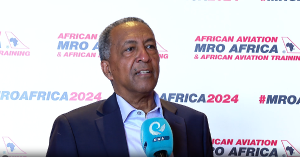
.jpg)

.jpg)
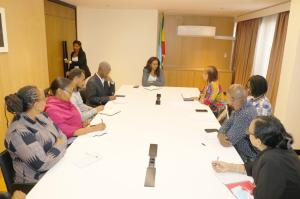
.jpg)
.jpg)
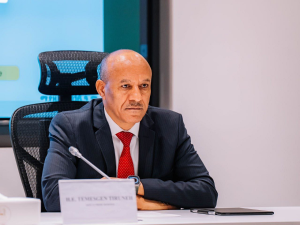
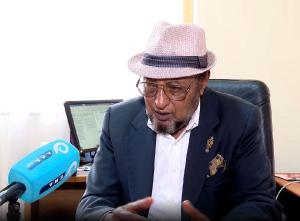
.jpg)

.jpg)
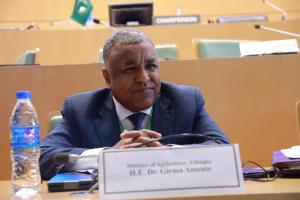
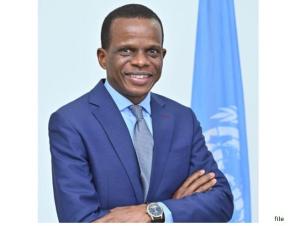
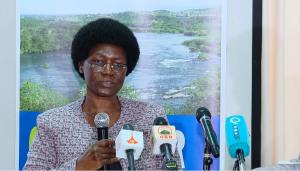
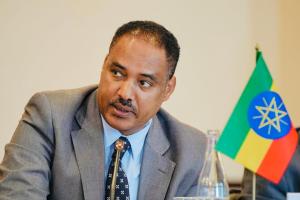
.jpg)
